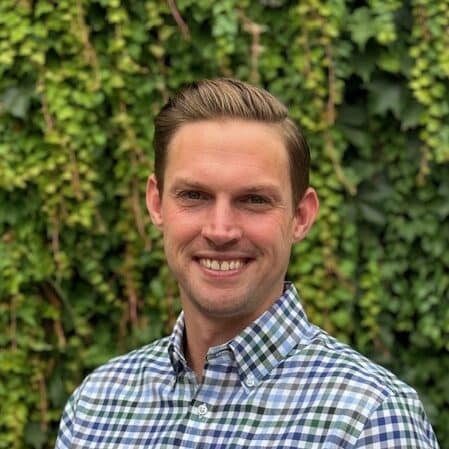Scott is a psychotherapist at Wildflower. In his clinical practice, Scott draws on Acceptance and Commitment Therapy, Dialectical Behavior Therapy, Solution-focused Therapy, Strengths-based Therapy, and Cognitive Behavioral Therapy. Scott works with adults, couples, and family structures experiencing stressful transitions including the transition to parenthood, anxiety, mood disorders, trauma, sexual challenges, men’s issues, self-esteem, stress, athletic and work performance, and relationship issues. Scott has experience in addressing generalized anxiety, depression, related athletic and work performance issues, as well as social anxiety and relationship challenges in young adult populations. He obtained his master’s degree at Northeastern Illinois University in Clinical Mental Health Counseling. Read Scott’s full bio here.
What inspired you to pursue a career as a psychotherapist?
At its core, it boils down to wanting to pursue a career oriented around helping others. I always had an interest in psychology, particularly in the sports world where I was first meaningfully introduced to it in high school. However, in college I didn’t quite see the path forward in the field at the time. With that said, I have a background as a soccer coach and while that is quite different from the role of psychotherapist, there are some similarities and parallels, so I was always kind of scratching the itch one way or another. The turning point for me was benefiting from therapy in my personal life and the “light bulb” flickering that this was a career path I could pull a lot of meaning from by making a difference!
As a psychotherapist, what part of your job is most satisfying?
I think it’s moments in a session… When we cut through the difficult with a moment of levity or humor… When clients have small “light bulb” moments when all of a sudden something new or clear comes up for them… When clients describe examples of empowerment or agency in the face of their challenges. Whether or not I’m directly making a difference in clients’ pursuits of their therapy goals, having the opportunity to foster connection and being privileged to observe their progress, no matter how teeny tiny it sometimes is, are the rewarding parts of the job.
How would you describe your therapeutic approach?
I had a coach many years ago who would say, “get comfortable being uncomfortable.” That sums up how I think about psychotherapy pretty well. Throughout our lives we’ve been conditioned to try and escape what scares or troubles us, and that’s on top of our basic instinct to escape danger! But I say we can actually find a lot of peace — more than we know is right there for the taking — if we improve our present-mindedness, embrace our negative emotions, anxieties, and stressors, and learn to “escape” them by accepting and moving through them.
Why do you believe that psychotherapy can help?
At its root, psychotherapy is a process of reflection on our lives. It’s aimed toward learning and understanding ourselves, others, and the larger systems/environments impacting us so we can, in time, learn to better adapt to the inherent challenges of life. I have always believed psychotherapy can only help if you want it to, so it has to start there. Now, as a therapist, I can help cultivate that desire. But at the end of the day, it is about the choices you are making for yourself. If you want to realize change in your life and you’re willing to embrace some discomfort and push your limits a little further, I believe growth is inevitable. So I guess I would say that empowerment is a big key.
What are some of your specialties and what drew you to them?
I really enjoy working with college-age and young adult populations. This period of life is fraught with transitions — new and intensifying responsibilities, career angst, relationship challenges, family planning, big life decisions… the list goes on. The kicker is so much of it is new, meaning many individuals lack the necessary experience in dealing with tons of change all at once. It’s a complex yet exciting time that can be stressful and scary! There is so much that might stem from these challenges in terms of depression, anxiety, trauma, self-esteem, etc., and all of these resulting emotional issues are fascinating to me. I focus a lot on harnessing the emotional challenges in terms of finding strength in and through them, rather than trying to escape them.
What is one thing about psychotherapy you wish everyone knew?
It’s a partnership, more than a directive kind of thing. At the end of the day, YOU should be in control. I can help guide the process, assisting in looking for possible paths forward and providing support along the way. But at the end of the day, you are the one who is doing the work and creating growth for yourself.
What is your motto or personal mantra?
Teddy Roosevelt used to say “Get action; do things; be sane…” The way I interpret that motto is by consistently taking meaningful action in life, putting one foot in front of the other, and striving for resilience we will generate meaning, strength, and accomplishment for ourselves. It’s a way to improve and maintain a healthy mindset. I love this notion.
What are your favorite self-care activities?
Exercise is probably top of the list. I enjoy running, hiking, golfing, and generally working out — really just about anything that keeps me moving. I ran a half-marathon for the first time in 2023 and while I’m very glad I did it, I’m almost very sure I won’t do it again! Anyway, I find I’m more motivated, creative, calm, and present if I’m able to prioritize exercise in my life. Beyond that, I journal to keep focus on gratitude and processing challenges. I also rely on music (I like pretty much all of it), a consistent sleep routine, hanging out with my wife and pup, and always making time for friends and family.


